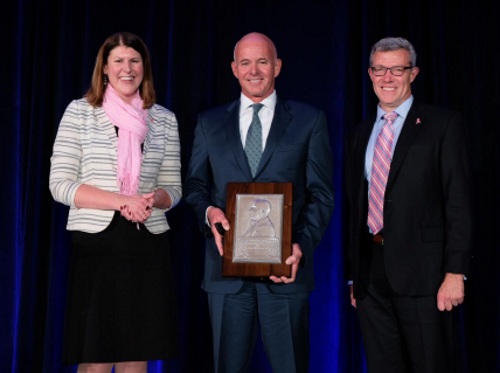On November 13, the board of directors for the American Association of State Highway and Transportation Officials unanimously passed a resolution pledging to address issues related to race, equity, diversity, and inclusion. The organization also agreed to address those efforts within the transportation industry with “humility, introspection, and respect, being mindful of the importance of listening to and learning” from those most adversely affected by past decisions.
[Above photo by the Oregon DOT.]
“We understand that these measures depend on collaboration with all relevant stakeholders, including government, transportation partners, and the communities we serve,” the resolution stated. “We pledge to continue to collaborate closely with national, state, and regional organizations focused on those issues.”

The resolution also committed AASHTO and its state department of transportation members to six action areas:
- Strengthening its commitment to the values acclaimed in the Civil Rights Act of 1964 and associated statutes, seeking to protect all people from discrimination based on race, color, religion, sex, national origin, disability, or age, and seeking to advance those goals in the delivery of our programs and services, working with our business partners and community and faith based organizations.
- Enhancing decision-making processes focused on advancing racial justice and incorporating equity, diversity, and inclusion in all aspects of transportation, including, but not limited to investment priorities, policy development, project and program delivery, environmental justice, or in other areas, through more effective public engagement processes, especially in historically underserved communities.
- Improving contracting and procurement practices to remove barriers and create opportunities for Disadvantaged Business Enterprises and people of color so that they may participate in the economic benefits derived from transportation investments.
- Creating additional strategies to improve recruitment, hiring, promotion, training, leadership development, and retention of and support for a workforce at all levels that reflects the communities we serve, through efforts including more robust outreach to educational institutions and community and faith based organizations traditionally serving people of color.
- Providing workforce development and other training opportunities to develop competencies and create accountability for promoting equity, diversity, and inclusion to address racism and inequality.
- Fostering inclusive workplaces where discrimination and bias are not tolerated, where staff have redress for bias-related harms they experience or witness, and where staff at all levels are empowered to speak up against discrimination on behalf of themselves, their colleagues, and the communities AASHTO and its members serve.
“These are significant issues,” stressed Shawn Wilson, Ph. D., secretary of the Louisiana Department of Transportation and Development and AASHTO’s 2020-2021 vice president, during the board’s discussion of the resolution.

“We have to deal with workforce development issues and foster disadvantaged businesses in the transportation space – and we can address those two issues by being more inclusive,” he explained.
“As an organization, it is important to lead consistent with our values and lead by example not just for other agencies but for our own departments as well; it helps us have a representative population running state DOTs,” Wilson added. “We are in good place working together for a good cause.”
Stephanie Pollack, secretary and CEO of the Massachusetts Department of Transportation, added that while conversations about race are difficult – “there is no single set of words that are the perfect embodiment of what we need to say,” she emphasized – it is critical to document “our values as state DOTs and acknowledge the plague that is racism.”
She also noted that that transportation sectors represented by AASHTO and state DOTs “need to know that we as leaders will tackle this scourge. It is vital for our credibility as leaders to take a strong stance on racism, diversity, equity, and inclusion.”
 AASHTO Annual Meeting
AASHTO Annual Meeting


